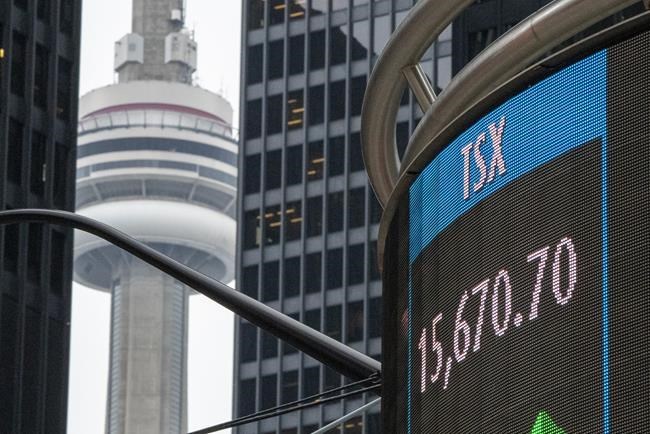TORONTO — Canada's main stock index dipped slightly Friday but concluded its best week in nearly seven months while the loonie reached its highest level since January.
Positive sentiment was spurred on by a close U.S. election with Congress appearing to be headed toward gridlock. The result would likely preclude tax increases and a small fiscal stimulus package.
Former Democratic vice-president Joe Biden is leading in final counting that could result in him being declared the winner. But President Donald Trump continues to vow to fight all the way to the Supreme Court.
Markets rose Friday as Biden took the lead in Pennsylvania and then dipped after Trump said he would continue to fight.
"It's not a whole lot of volatility compared to earlier this week, but in general, risk is ending on a high note which is why the stock market is still close to its highs of the week and why the U.S. dollar is still close to its lows of the week," said Erik Bregar, head of currency strategy at the Exchange Bank of Canada.
Markets soared this week with the TSX rising 4.5 per cent for its best performance since the week of April 9. U.S. markets performed even better, gaining between 6.9 and nine per cent.
Bregar said the strong rally was surprising given that there's a chance Trump would contest the result all the way until January.
"I wouldn't be surprised at this point if Biden ultimately wins. I just think Trump is serious with this threat today of fighting till the end. And I worry a little bit that the markets are not taking the threat of a contested result more seriously," he said in an interview.
Bregar said many people want Trump to concede and view him as a sore loser.
"I don't see him going quietly into the sunset if what he's saying is true," he said referring to "illegal" votes.
Despite the uncertainty, he sees markets continuing to rally next week. A sign of that Friday was in Eurodollar call-buying, he said.
A lot of people are also "taking negative bets off the table" which could raise sentiment, Bregar added.
The market's attitude toward election risk is the same approach to COVID-19 infections, he said.
It reacts after a lockdown is announced but the response then peters out.
The record high number of U.S. infections don't appear to be having any impact, Bregar said.
"The market's not going to react till things actually start breaking down."
Jobs number for October also didn't move the needle. Canada added 83,600 jobs as the unemployment rate dipped to 8.9 per cent. In the U.S., the rate fell to 6.9 per cent after the economy added 638,000 jobs.
The S&P/TSX composite index closed down 15.34 points to 16,282.83.
The Dow Jones industrial average was down 66.78 points to 28,323.40. The S&P 500 index was down 1.01 points to 3,509.44, while the Nasdaq composite index was up 4.30 points to 11,895.23.
The Canadian dollar was trading at 76.69 cents US, the highest level since Jan. 8, and compared with an average of 76.62 cents US on Thursday.
The energy sector was the biggest loser on the TSX, falling 1.7 per cent as the price of crude oil fell. Arc Resources Ltd. dropped 6.2 per cent.
The December crude oil contract was down US$1.65 at US$37.14 per barrel and the December natural gas contract was down 5.4 cents at US$2.89 per mmBTU.
Materials was marginally lower despite higher metals prices.
The December gold contract was up US$4.90 at US$1,951.70 an ounce and the December copper contract was up 4.4 cents at US$3.15 a pound.
The big winner on the day was health care, which soared 5.3 per cent on strong gains from cannabis companies after voters in five U.S. states approved ballot measures to legalize marijuana.
Shares of Aurora Cannabis Inc. surged 55.9 per cent a day after gaining 40.5 per cent. Cronos Group Inc. rose 16.2 per cent while Canopy Growth Corp was 10.5 per cent higher.
This report by The Canadian Press was first published Nov. 6, 2020.
Companies in this story: (TSX:ACB, TSX:CRON, TSX:WEED, TSX ARX, TSX:GSPTSE, TSX:CADUSD=X)
Ross Marowits, The Canadian Press



